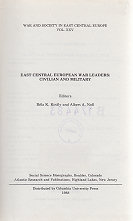
East Central European war leaders : civilian and military (előszó)
The present volume is the twenty-fifth of a series which, when completed, will present a comprehensive survey of the interactions between war and society in East Central Europe from the eighteenth to the twentieth centuries. These volumes deal with the peoples whose homelands lie between the Germans to the west, the Russians to the east and north, and the Black, Mediterranean, and Adriatic Seas to the south. They constitute a particular civilization, an integral part of Europe, yet substantially different from the West. Within the area there are intriguing variations in language, religion, and government: so too, are there differences in concepts of national defense, of the characters of the armed forces, and of ways of waging war. Study of this complex subject demands a multidisciplinary approach: therefore, we have involved scholars from several disciplines, from universities and other scholarly institutions of the USA, Canada, and Western Europe, as well as the East Central European socialist countries and the Soviet Union.
Our investigation focuses on a comparative survey of military behavior and organization in these various nations and ethnic groups, to see what is peculiar to them, what has been socially and culturally determined, and what in their conduct of war was due to circumstance. Besides making a historical survey, we try to define different patterns of military behavior, including the decision-making processes, the attitudes and actions of diverse social classes, and the restraints or lack of them shown in war.
We endeavor, in this and future volumes, to present considerable material on social, economic, political, and technological changes, and of changes in the sciences and in international relations and their effects on the development of doctrines of national defense and practices in military organization, command, strategy, and tactics. We present data on the social origins and mobility of the officer corps and the rank and file, on the differences between the officer corps of the various services, and above all, on the civil-military relationship and the origins of the East Central European brand of militarism. The studies will, we hope, result in a better understanding of the societies, governments, and politics of East Central Europe, most of whose peoples are now members of the Warsaw Treaty Organization, although one country is a member of NATO and two are nonaligned.
Our methodology takes into account that in the last three decades the study of war and national defense systems has moved away from narrow concern with battles, campaigns, and leaders, and has come to concern itself with the evolution of society as a whole. In fact, the interdependence of changes in society and changes in warfare, and the proposition that military insitutions closely relect the character of the society of which they are a part have come to be accepted by historians, political scientists, sociologists, philosophers, and other students of war and national defense. Recognition of this fact constitutes one of the central concerns of our approach to the subject.
Works in Western languages adequately cover the diplomatic, political, intellectual, social, and economic histories of these peoples and this area. In contrast, few substantial studies of their national defense systems have yet appeared in Western languages. Similarly, although some substantial, comprehensive accounts of the nonmilitary aspects of the history of the whole region have been published in the West, nothing has yet appeared in any Western language about its national defense systems. Nor is there any study of mutual effects of the concepts and practices of national defense in East Central Europe. Thus, our comprehensive study of War and Society in East Central Europe has been a pioneering work.
The Editor-in-Chief has, of course, the duty of assuring the comprehensive coverage, cohesion, internal balance, and scholarly standards of the series he launched. He cheerfully accepts this responsibility and intends this work to be neither a justification nor a condemnation of the policies, attitudes, or activities of any of the nations involved. At the same time, because so many different disciplines, languages, interpretations, and schools of thought are represented, the policy in these past and future volumes has been, and shall be, to interfere with the contributions of the various participants, but to present them as a sampling of the schools of thought and the standards of scholarship in the many countries to which the contributors belong.
Béla K. Király